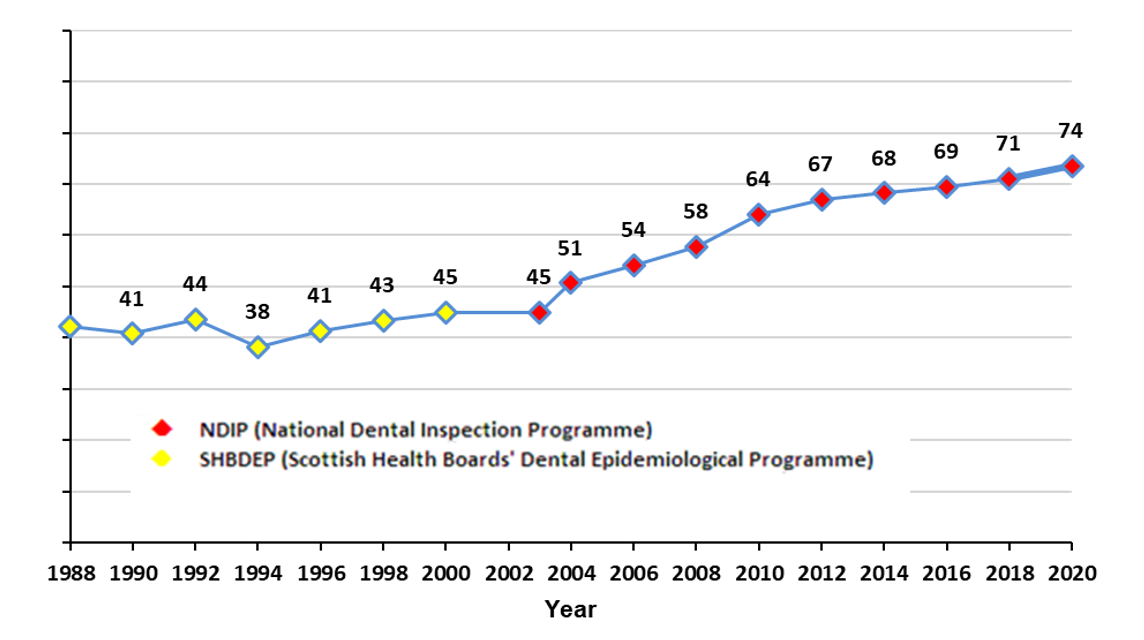National dental inspection programme
School year 2019 to 2020
An Official Statistics publication for Scotland
- Published
- 20 October 2020
- Type
- Statistical report
- Author
- Public Health Scotland
About this release
This release by Public Health Scotland (PHS) provides information on findings of the Detailed Inspection programme of P1 children in school year 2019 to 2020. The National Dental Inspection Programme (NDIP) is carried out annually under the auspices of the Scottish Dental Epidemiology Co-ordinating Committee on behalf of NHS boards.
It should be noted that the inspection programme was affected by the interruption to the school year by the COVID-19 (Coronavirus) outbreak, in particular when the nation entered the period of 'lockdown' on 23 March 2020. This impacted principally the numbers of children seen as part of the basic inspection, while the detailed inspection numbers were much less affected.
Main points
- Almost three quarters (73.5%) of P1 children had no obvious decay experience in their primary teeth in the school year 2019 to 2020. This is a large improvement since the NDIP commenced in school year 2002/03 (45%).

- In the school year 2019 to 2020, the average number of teeth affected by obvious decay experience in P1 children was 1.04. This is a substantial improvement since the school year 2002 to 2003 when the average number of teeth affected was 2.76.
- There is a continuing link between area-based socio-economic deprivation and poor dental health among P1 children in Scotland. Only 58.1% of P1 children had no obvious decay experience in the most deprived areas compared with 86.9% in the least deprived areas.
Background
The National Dental Inspection Programme (NDIP) is carried out annually under the auspices of the Scottish Dental Epidemiology Co-ordinating Committee on behalf of NHS boards. Its principal aims are to inform parents/carers of the dental health status of their children and, through appropriately anonymised, aggregated data, advise the Scottish Government, NHS boards and other organisations concerned with children’s health of dental disease prevalence at national and local levels. This ensures that reliable dental health information is available for planning initiatives directed towards health improvements.
Two school year groups are involved: i) at entry into local authority schools in primary one (P1) and ii) in primary seven (P7) before the move to secondary education. The Inspection Programme has two levels: a basic inspection (intended for all P1 and P7 children) and a Detailed Inspection (where a representative sample of either the P1 or the P7 age group is inspected in alternate years). '.No obvious decay experience' is recorded when there are no obviously decayed, missing or filled teeth.
Each NHS board is required to identify the number of local authority schools needed to obtain a representative sample of a given size from their P1 population. The sample sizes used provide adequate numbers to allow meaningful statistical comparisons between NHS boards. Whole classes are randomly selected to simplify the process for schools while ensuring that results are representative of the P1 population in Scotland.
Further information
A more in-depth presentation of the results can be found in the full report available at the top of this page. NHS Education for Scotland (NES) publishes information relating to the general dental service (GDS) workforce (external website) in Scotland.
PHS publishes an annual NHS Adult & Child Fees and Treatments report providing information on GDS fees paid to dentists and on treatments provided to children and adults.
PHS publishes an annual NHS Registration and Participation report providing information on NHS GDS registrations and participation (contact with GDS).
The next release of this publication will be 19 October 2021.
General enquiries
If you have an enquiry relating to this publication, please email phs.dental-info@phs.scot.
Media enquiries
If you have a media enquiry relating to this publication, please contact the Communications and Engagement team.
Requesting other formats and reporting issues
If you require publications or documents in other formats, please email phs.otherformats@phs.scot.
To report any issues with a publication, please email phs.generalpublications@phs.scot.
Older versions of this publication
Versions of this publication released before 16 March 2020 may be found on the Data and Intelligence, Health Protection Scotland or Improving Health websites.
